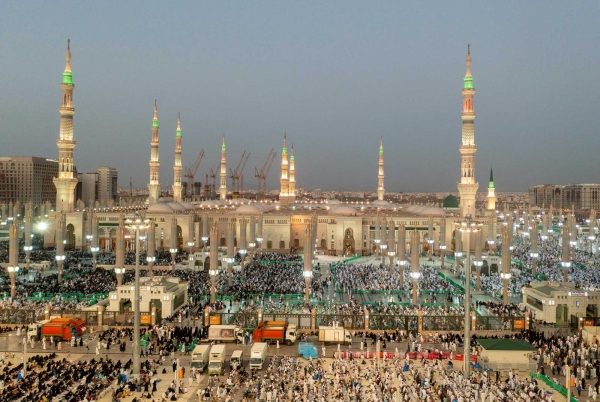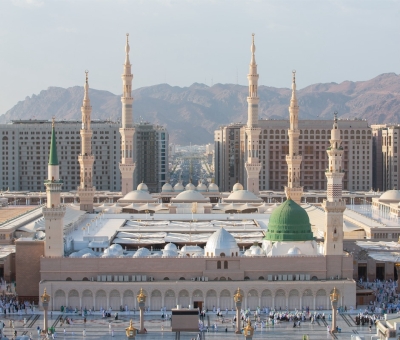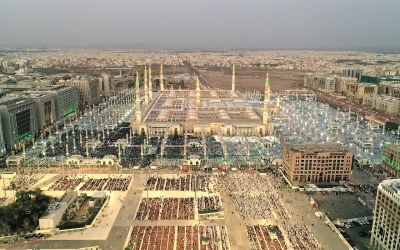

Seclusion (I'tikaf) in the Prophet's Mosque is the period during which men and women seclude themselves in the Prophet's Mosque, dedicating their time to worship, remembrance of Allah, and reading of the Quran, following the tradition of Prophet Muhammad, peace be upon him (PBUH). This practice takes place during the last ten days of Ramadan.
The number of worshippers who are secluded in the Prophet's Mosque during the last ten days of Ramadan in 2024 reached 4,700 men and women.
Organizing seclusion in the Prophet's Mosque
The General Authority for the Affairs of the Grand Mosque and the Prophet's Mosque oversees the organization of seclusion in the Prophet's Mosque. They issue permits to male and female worshippers through their official website. Registration for seclusion can also be completed via the 'Visitors' app for smart devices, where the permit is issued immediately upon completion of the registration process.
Seclusion locations in the Prophet's Mosque
Dedicated areas are allocated for men and women to seclude in the Prophet's Mosque. The necessary facilities and services are provided for the worshippers, including drinking water, cleanliness, and other services. They are offered iftar and suhoor meals, along with hot and cold beverages. Lectures in various languages are provided. Scientific and guidance lessons are provided, along with Quranic study circles to correct recitation. Additionally, guidance screens are available for those in seclusion.
Conditions and controls for seclusion in the Prophet's Mosque
The General Authority for the Affairs of the Grand Mosque and the Prophet's Mosque has set specific conditions and controls for seclusion in the Prophet's Mosque. The conditions include agreeing to and adhering to the mosque's rules and regulations, entering for seclusion at the specified time on the twentieth of Ramadan, and being at least eighteen years old.
The authority has provided several guidelines for worshippers who are secluded. These include participating in Taraweeh and Tahajjud prayers with the imam, maintaining a clean appearance and appropriate clothing, avoiding loud conversations to prevent disturbing other worshippers, not bringing items that disrupt the mosque's appearance such as extra mats and clothing, and keeping any such items in the designated lockers on the northern side of the mosque. Additionally, worshippers are advised to keep their belongings organized at all times to avoid obstructing pathways or prayer rows and to avoid sitting in walkways and near the partition between the men's and women's sections.
The guidelines also emphasize not using the mosque's items for purposes other than those intended, or moving or changing their position, such as Quran chairs and their cabinets, rugs, thermoses, and drinking cups. Worshippers are encouraged to keep their seating area clean and tidy, and to cooperate with mosque staff in their duties of cleaning, organizing, and keeping pathways clear.
The authority also stressed the importance of not bringing unauthorized food into the Prophet's Mosque and consuming it outside instead. Worshippers should ensure they dispose of their waste in the designated bins and not place it in the bases of thermoses. They should avoid placing personal items or shoes on air conditioning vents and Quran cabinets or hanging them on the mosque walls. Additionally, worshippers are advised not to disturb others by talking on mobile phones and to promptly remove all belongings once the month of Shawwal is confirmed.
Related quizzes

